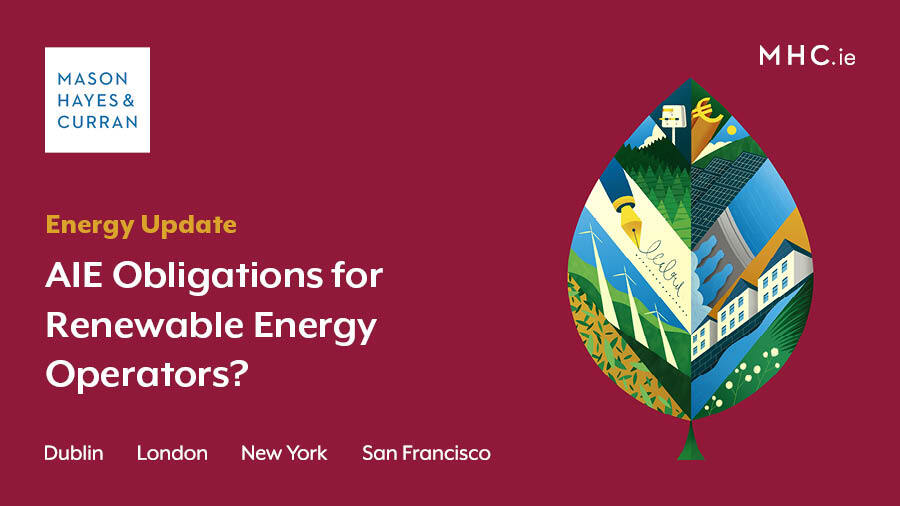AIE Obligations for Renewable Energy Operators?

A recent Supreme Court decision indicates that private energy generators could be considered to be ‘public authorities’. As a result, they may be subject to the environmental information regulatory regime, which imposes significant obligations on ‘public authorities’ to make ‘environmental information’ available on request. Our Energy team considers the implications of this decision for private energy generation projects.
The Supreme Court’s decision in Right to Know CLG v Commissioner for Environmental Information and Raheenleagh Power DAC [2024] IESC 7, delivered on 6 March 2024, has been highly anticipated in the renewable energy industry given the considerable significance for private companies operating within this sector.
A question raised in this case is whether a private renewable energy company, in this case Raheenleagh DAC (RP), could be subject to the environmental information regulatory regime. This regime imposes significant obligations on 'public authorities' to disseminate and make available, upon request, 'environmental information'. If RP is found to be a public authority, this will place significant obligations on renewable energy developers to disseminate and make “environmental information” available, on request. However, the Supreme Court has not decided the issue. Instead, it has referred the matter back to the Commissioner for Environmental Information for determination. In this article, we analyse the Supreme Court decision[1] and explain what this means, in practical terms, for private companies operating in the renewable energy sector during this period of continued uncertainty.
Definition of a ‘public authority’ under the AIE Regulations
The Directive and the AIE Regulations define a ‘public authority’ to include a body which meets one or more of the following three limbs:
- Government or other public administration, including public advisory bodies, at national, regional or local level
- Any natural or legal person performing public administrative functions under national law, including specific duties, activities or services in relation to the environment, and
- Any natural or legal person having public responsibilities or functions, or providing public services, relating to the environment under the control of a body or person falling within (a) or (b)
It was agreed by all parties that RP was not a ‘public authority’ within the meaning of the first limb, so the debate centred around the interpretation of paragraph (b) and (c).
The Supreme Court decision
In brief summary, in January 2021, the High Court determined that RP is a private energy generation project and was subject to the European Communities (Access to Information on the Environment) Regulations 2007 (AIE Regulations). This was because it satisfied the definition of a “public authority” under that legislation. The Court of Appeal overturned that decision. Further analysis of these decisions is available in our previous articles - High Court[2] and Court of Appeal.[3]
The Supreme Court stated that it would not give any “decided or binding views on issues that were not previously argued before and decided by the Commissioner at first instance” but considered it appropriate to indicate the approach that should be taken.
The Supreme Court's comments suggest that generating electricity from renewable sources could be viewed as serving a public interest. This is especially true if the generation is part of a State aid program. With this in mind, it seems that the Supreme Court’s position is that a private renewable energy generator could be a ‘public authority’ under the AIE Regulations.
Key takeaways
The following key points from the Supreme Court judgment will be highly instructive going forward, even in the absence of a final determination:
Is electricity generation a service of public interest?
- The fact that RP generates renewable energy is a “key feature” of its operations which “could be relevant to any determination as to whether the company is engaged in the provision of a public service” for the purpose of limb (b) and/or (c). This is on the basis that renewable generators are treated “quite differently” under EU and national legislation to a producer using non-renewables, in that they may be eligible for State aid price support regimes, such as the REFIT scheme in RP’s case.
- The Supreme Court disagreed with the Court of Appeal’s finding that the generation of electricity was no longer a service in the public interest because it is a ‘voluntary or optional’ activity. The suggestion that a service can only be considered in the public interest if it is, in effect, compulsory, goes too far.
What does it mean to be ‘entrusted’ with the performance of services of a public interest for the purpose of ‘limb (b)’?
- The CJEU’s use of the term ‘entrusted’ in the Fish Legal[4] test for limb (b) of the ‘public authority’ definition is important and should not be disregarded. It implies that there must be “some level of obligation” regarding the performance of services of a public interest. However, as noted, this does not necessarily imply the need for there to be a “compulsion to provide a predetermined level or form of service”.
What will constitute ‘special powers’ for the purpose of ‘limb (b)’?
- The relevant powers should not be considered in isolation but must be considered in the context of the purpose for which they have been vested in the entity. There is “little point in examining the disputed powers without regard to the nature of the purpose for which they have been conferred.” To meet the ‘limb (b)’ test, the powers must not only go beyond normal private law rules but must also be vested for the purpose of performing services of a public interest.
- In the case of RP, it will be necessary to analyse the terms of its licence and authorisation under the Electricity Regulation Act 1999 Act. The Supreme Court did not have these documents before it so was unable to conclude on this point.
- “Great care” should be taken in considering powers granted under a licence. The fact that powers are vested through a licence does not necessarily mean that they are ‘special powers’ vested for the purpose of performance of services of public interest; “a great many occupations and businesses can only be pursued with a licence, under a statutory scheme of regulation, but they will not necessarily be covered by the directive”.
- The fact that further authorisation or approval is required from a regulatory body to exercise the relevant powers is “significant” but not “necessarily decisive”.
What will constitute ‘control’ by a public authority for the purpose of ‘limb (c)’?
- This is a “mixed question of fact and law” which cannot be determined “by reference simply to the question whether a shareholder owns more than 50% of the issued shares.” Rather, it requires an investigation into the “ownership, management and actual operation of the company at the relevant time”. This had not been carried out by the Commissioner regarding RP.
Implications for renewable energy developers and operators
With the Court of Appeal decision, there was a clear and resounding ‘no’ to the question of whether a private renewable energy company was a ‘public authority’ for the purpose of the AIE Regulations.
Following the Supreme Court’s decision, the renewable energy industry no longer has this certainty or reassurance. What is clear from the Supreme Court’s decision is that a private company generating electricity from renewable sources could fall within the scope of the AIE Regulations, and therefore the obligations in the AIE Regulations must be considered by private energy generation developers and operators.
For information and expert advice, contact a member of our Energy or Public, Regulatory & Investigations teams.
The content of this article is provided for information purposes only and does not constitute legal or other advice.
[1] Right to Know CLG -v- Commissioner for Environmental Information & Raheenleagh Power DAC [2024] IESC 7
[2] Right to Know CLG -v- Commissioner for Environmental Information [2021] IEHC 46
[3] Right to Know CLG -V- Commissioner for Environmental Information [2022] IECA 210
[4] Fish Legal and Shirley v. Information Commissioner & Ors (C-279/12)
Share this:






